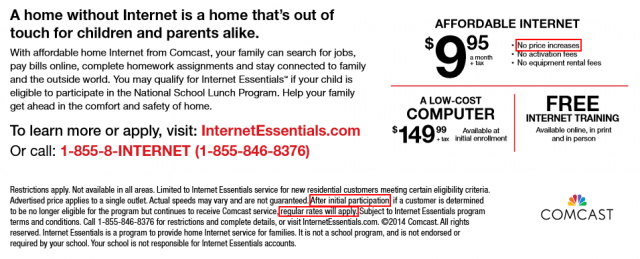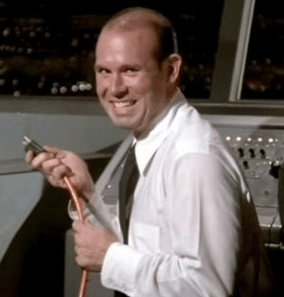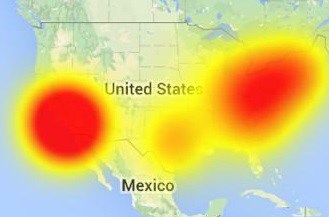 As regulators ponder Comcast’s application to acquire Time Warner Cable, the issue of affordable Internet has been a hot topic as part of the merger review. So it is no surprise Comcast has announced it is extending its recent offer of six free months of Internet Essentials service to income-challenged families with school age children an extra 10 days.
As regulators ponder Comcast’s application to acquire Time Warner Cable, the issue of affordable Internet has been a hot topic as part of the merger review. So it is no surprise Comcast has announced it is extending its recent offer of six free months of Internet Essentials service to income-challenged families with school age children an extra 10 days.
“On August 4th, we made a special announcement: we are offering any family that has not yet signed up for Internet Essentials, up to six months of free service, if they apply before September 20th,” said Comcast executive vice president David Cohen on Comcast’s blog. “Today, I’m thrilled to announce we’re going to extend that offer through Tuesday, September 30th.”
Comcast admits that only families that have never applied for Internet Essentials in the past can receive free service. Those already enrolled or who attempted to enroll in the past do not qualify.
The cable company does not make participation easy and is intent on protecting the revenue it earns selling regularly priced Internet service by keeping current customers out of the Internet Essentials program.
Just qualifying for Internet Essentials requires navigating an obstacle course:
The program is only available to households:
- that have at least one child who is eligible to participate in the National School Lunch Program (the “NSLP”) and as confirmed annually while enrolled in the program;
- do not have an overdue Comcast bill or unreturned equipment; and
- have not subscribed to any Comcast Internet service within the last ninety (90) days.

Internet Essentials promises no price increases, but the fine print suggests otherwise.
The program will only accept new customers for three full school years. After that, if Comcast decides it doesn’t want to offer the service any longer, customers are out of luck. Comcast can also restrict enrollment periods when it accepts new participants and requires annual verification paperwork demonstrating continued participation in the NSLP.
Comcast can throw families out of the program: if a child relocates outside of the household, loses NSLP eligibility, if a bill is paid late, if Comcast decides to stop offering the program, or if your account is closed. If you move, your account will be closed even if you choose to continue Comcast service at your new address, so don’t plan on going anywhere.
If and when Comcast determines your participation in Internet Essentials is over, your rates will automatically reset to standard Internet pricing without further notice. So much for promises of no rate increases. Those regular prices start at around $40 a month + a monthly modem rental fee of around $8 — quite a difference from $9.95.
Although the terms and conditions do not reflect it, Comcast claims to be continuing an “amnesty program” for would-be applicants with past due balances:
If customers have an outstanding bill that is more than one year old, then as long as they meet all the other eligibility criteria, they can apply to the program and we will provide amnesty for that back due bill for the purpose of connecting to Internet Essentials. If customers’ outstanding bills are less than a year old, however, then we would like them to settle that debt with us before they can be eligible to apply for the program. We are willing to work with families whose debt is reasonable enough that that they could pay us back in installments.
For more information, visit www.internetessentials.com or, for Spanish, www.internetbasico.com. You can also call 1-855-8-INTERNET or, for Spanish, 1-855-SOLO-995.


 Subscribe
Subscribe


 Staff at the New York regulator overseeing the state’s telecommunications companies have determined that some Time Warner Cable customers will see their largest rate increase in New York history — more than double their current rate — if Comcast is successful in its bid to acquire Time Warner Cable.
Staff at the New York regulator overseeing the state’s telecommunications companies have determined that some Time Warner Cable customers will see their largest rate increase in New York history — more than double their current rate — if Comcast is successful in its bid to acquire Time Warner Cable. Comcast has strongly denied reports it threatened customers with service termination for using the Tor anonymous web browser, designed to obscure a web user’s identity or location.
Comcast has strongly denied reports it threatened customers with service termination for using the Tor anonymous web browser, designed to obscure a web user’s identity or location. But whether the messages reported by Deep.Dot.Web were simply the result of an overeager support employee or actual company policy is now in dispute.
But whether the messages reported by Deep.Dot.Web were simply the result of an overeager support employee or actual company policy is now in dispute.

